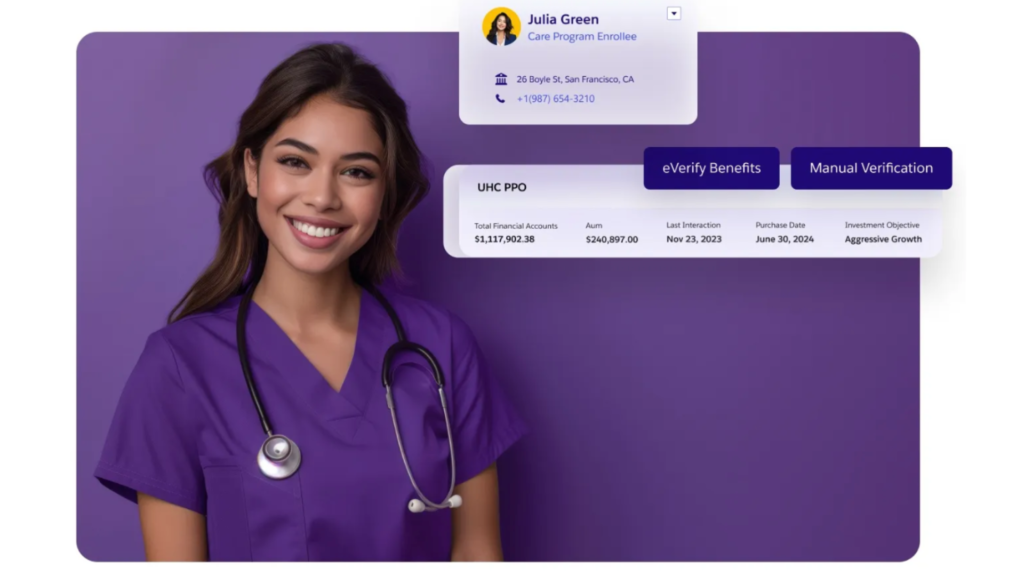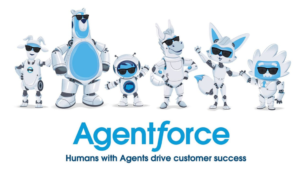Artificial intelligence (AI) is revolutionizing the life sciences industry, offering innovative tools to improve decision-making, streamline processes, and drive better outcomes. By seamlessly integrating into daily workflows, AI empowers organizations to enhance efficiency and deliver life-changing therapies to patients faster. From generative and agentic AI to predictive intelligence, an AI-driven CRM platform tailored for life sciences can help Pharma and MedTech companies implement scalable, reliable solutions with ease.
AI’s potential to transform operations extends across the life sciences landscape, from clinical trials to patient support. Let’s see three impactful ways healthcare organizations are leveraging AI today:
1. Enhancing Clinical Trial Recruitment and Management
Recruiting participants for clinical trials remains a major challenge for life sciences organizations. Despite the growing number of clinical trials, many fail to meet enrollment targets, with over 80% of trials falling short. Often, the issue stems from difficulties in identifying eligible candidates or keeping them engaged. Many prospective participants are unaware of trials that suit them, leading to manual and inefficient recruitment processes.
AI offers transformative solutions:
- Generative AI enables clinical and R&D teams to match trial participants with studies more accurately, reducing costs and increasing enrollment rates. Learn more about AI in clinical trial recruitment.
- Agentic AI optimizes site selection by analyzing historical healthcare data, geographic information, and site performance to identify locations most likely to succeed. Discover how AI streamlines site selection.

- Predictive AI designs clinical studies by aggregating scientific data, patient demographics, and market insights, ensuring more effective investment decisions. Explore the benefits of predictive AI in clinical design.
Together, these capabilities accelerate drug development, limit participant dropout, and streamline recruitment processes, ultimately bringing therapies to market faster.
2. Saving Time for Sales Representatives with Automation
For sales teams, time is a critical resource. AI helps sales reps manage their responsibilities efficiently by automating repetitive tasks and providing actionable insights:
- Inventory Management: AI-powered agents notify sales reps of potential product shortages and recommend solutions, such as transferring inventory from other representatives.
- Proactive Notifications: Assistive tools alert teams to compliance risks, such as exceeding prescription sampling limits, ensuring adherence to regulations.
- Streamlined Communication: AI automates the creation of secure and tailored sales emails, helping reps notify stakeholders about rebates, draft contract quotes, or follow up on meetings. Reps can also use assistive agents to identify declining procedures among healthcare professionals (HCPs) or tailor key messaging for upcoming calls.
These tools free up valuable time, enabling sales reps to focus on building stronger relationships with HCPs and delivering critical therapies to patients without delays.
3. Improving Patient Support Programs
Patient support services play a vital role in ensuring timely access to medication and improving adherence to prescribed therapies. AI-driven solutions enhance these programs by:
- Assistive Agents: Automating administrative tasks like generating call scripts or collecting missing insurance details to prevent treatment delays.
- Proactive Alerts: Autonomous agents notify patient services teams of potential disruptions in therapy access, ensuring seamless scheduling for personalized medicine delivery.
By optimizing patient services, AI helps case managers focus on delivering personalized care and improving clinical outcomes for patients.
Unlock the Full Potential of AI in Life Sciences

AI is reshaping the life sciences industry, providing transformative solutions to some of its most pressing challenges. By embedding AI into operations, Pharma and MedTech organizations can increase efficiency, accelerate drug development, and create a more patient-centric healthcare ecosystem.
The future of AI in life sciences holds immense potential. As the technology evolves, its role in enhancing outcomes and driving innovation will only grow. The time to embrace AI’s possibilities is now—because the question isn’t if AI will revolutionize life sciences, but how quickly the industry can adapt.









